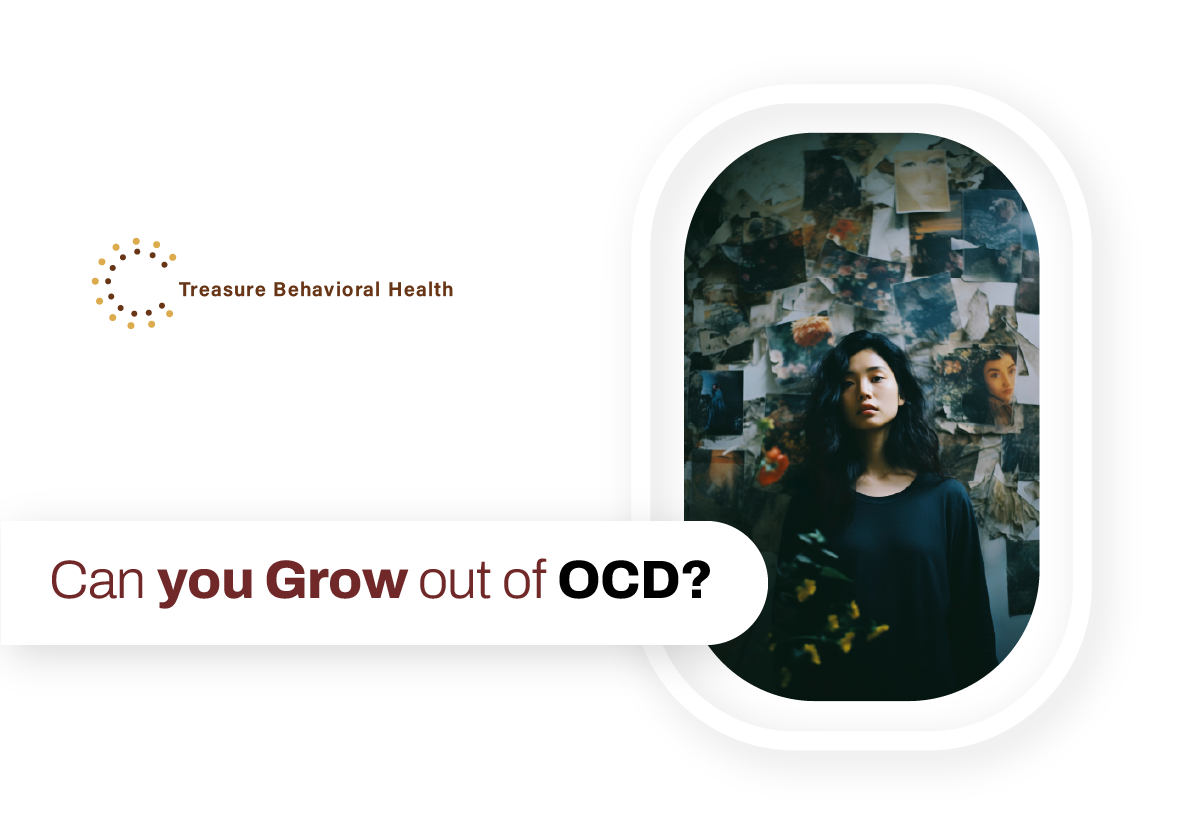Millions of people suffer from intrusive thoughts. Obsessive-Compulsive Disorder (OCD) combines these thoughts with compulsive rituals. This cycle disrupts daily life and causes significant distress. People often wonder, “Can you grow out of OCD?” The answer isn’t simple. Many seek relief but must face the disorder’s complexities.
Obsessive-compulsive disorder (OCD) affects adults of any gender. Teens can start experiencing it, but it may also affect children. It’s a chronic condition, but targeted therapies can reduce intrusive thoughts and compulsions.
The right treatment can help many regain control of their lives. It can ease symptoms that appear unbeatable. For the 1-2% living with OCD, hope remains.
Struggling with OCD? Treasure Behavioral Health is here to help. Our experts offer personalized care, support, and treatments to ease your distress. Don’t face OCD alone. Let us guide you to relief and better health.
What Is OCD, and What Age Does OCD Start?
Unwanted thoughts often come to the mind. These can be ideas, impulses, or images. Many people feel a lot of distress or anxiety. Psychiatrists call these “obsessions.” They’re a key feature of some mental health conditions.
Obsessed with or following strict rules, people have compulsions. These are repetitive actions or thoughts. For example, someone might wash their hands repeatedly or cover their head. Such actions help reduce anxiety from obsessions or prevent feared events. Whether obvious or hidden, these behaviors come from a strong urge to act.
OCD often starts in childhood or early adulthood. By age 14, 25 percent of cases appear, with the average beginning at 19. Males show symptoms earlier, often before age 10. While rare after 35, OCD can still develop later. Symptoms usually start slowly but can also begin suddenly. This condition affects everyone, with onset patterns differing by gender.
Factors that Influence Symptom Severity
Genetics, environment, and stress influence the impact of OCD. Symptoms vary among people. Life changes can improve or worsen the condition. Some feel better over time, while others struggle more. OCD’s severity changes with personal and external factors.
- Genetics
Research indicates that genetics significantly contribute to OCD. People with a family history of OCD are at higher risk. However, a genetic tendency doesn’t guarantee someone will develop OCD.
- Environment
Childhood experiences, trauma, and stress can worsen OCD symptoms. For example, stress or trauma may worsen symptoms. But a supportive environment may help.
The Impact of Family Background on OCD Episodes
As mentioned, a family history of OCD can increase the risk of developing it. Some genetic and environmental factors may be inherited.
Also, having a parent or sibling with OCD can influence its development. Children may learn behaviors or thought patterns from their families. They may also feel more stress and anxiety at home.
Does Childhood OCD Go Away?
Some children may outgrow OCD. But, many do not without help. It’s crucial to seek a mental health professional. It can help manage and reduce symptoms.
Key points to consider include:
- Persistence of Symptoms: OCD in children causes distressing, unwanted thoughts and behaviors. They are time-consuming. The thoughts are obsessions. The behaviors are compulsions. If these symptoms are not addressed, they may continue or worsen over time.
- Treatment is Key: Early, effective treatments, like CBT, can help a lot. CBT helps children manage their fears and reduce compulsive behaviors. It may decrease their symptoms over time.
- Individual Differences: Each child’s experience with OCD is unique. Some may find their symptoms decrease naturally. Others may need ongoing support and treatment.
- Support Systems: Involvement from families and schools in therapy can improve outcomes. A supportive environment can help reduce stress and OCD symptoms.
- Potential for Change: Symptoms of OCD can change over time. For some, behaviors may change. However, untreated anxiety may persist.
How to Break OCD Cycle
There is hope for people with OCD. This is true, no matter how severe their symptoms are. Proactive OCD treatment, when symptoms are mild, can prevent tough episodes later. It is effective if done early. If your symptoms cause distress and impairment and you want a change, you can get better with ERP (Exposure and Response Prevention) therapy. It uses exposure and response prevention.
ERP is an evidence-based treatment. Decades of research show it is very effective for OCD. Most individuals who do ERP with a trained therapist see benefits. They have less anxiety and distress. They also feel more confident facing their fears.
In ERP, people work with their therapist. They build an exposure hierarchy and confront their fears, one trigger at a time. An ERP therapist usually starts with easy exercises. They cause a low level of fear and anxiety. They then work up to harder exposures as confidence builds.
In exposures, the goal is always response prevention. It means resisting the urge to respond to fear and anxiety. Don’t give in to compulsions or avoid triggers. In time, this helps you tolerate anxiety. It does so without using compulsions or avoidance to feel better.
Wrapping Up
Can you grow out of OCD?
In conclusion, some children may outgrow OCD. But, many do not without proper treatment. Early intervention, such as cognitive-behavioral therapy, can help manage symptoms with significant success. Each child’s experience is unique. So, it’s vital to seek help to reduce distress and improve well-being.
FAQs
Does childhood OCD go away?
Some children may outgrow OCD, but many need treatment. A mental health professional can reduce symptoms and improve life.
Can OCD get better with age?
OCD may improve with age and treatment. Yet, without help, it can persist or worsen. Everyone’s experience is unique.
How long does an OCD episode last?
OCD episodes vary in length. Some last minutes, others hours, or even days. Moreover, the intensity and frequency of symptoms change over time.


No comment